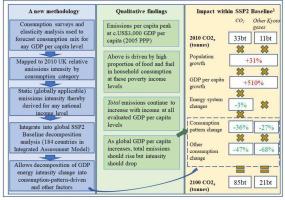The impact of income-driven changes in global consumption patterns on Kyoto Gas emissions during the twenty-first century
IF 6.6
2区 经济学
Q1 ECOLOGY
引用次数: 0
Abstract
Global 21st century Kyoto Gas emissions growth as forecast in SSP2 (a middle-of-the-road future climate scenario) is largely driven by expected: (a) per-capita GDP growth; and (b) energy/non-CO2 GDP intensity reduction. While models of the former have been comprehensively critiqued, the rationale for the latter has not.
This paper uses a new consumption-based methodology to determine likely future emissions intensity reductions implicit in changing consumption patterns. Its analysis of household expenditure surveys, macroeconomic data and income elasticities inform a model of how future consumption pathways could evolve with different levels of national incomes to 2100. These pathways are then combined with existing emissions intensity data to quantify the implied impacts of consumption change on overall emissions intensity. Introducing such a consumption factor into established decomposition methodologies then allows demonstration of the scale of non-consumption intensity reductions required.
Results suggest that emissions intensity peaks at poverty-like national income levels, where household/transport fuels dominate emissions. Thereafter, intensity reduces with national income growth, though absolute emissions continue to rise.
We find that expected changes in consumption patterns will deliver less than half required consumption energy intensity reduction to meet SSP2-Baseline projections to 2100. Such implied non-consumption-pattern improvement requirements may appear relatively undemanding in total against historic performance, but for some regions and timescales this is not the case and the role of mitigation in the historic data may render a forecast baseline (where mitigation is excluded) optimistic.
The paper's methodology and findings are relevant for inequality scholars, climate modellers, and governments and policymakers, helping them facilitate a better understanding of how consumption pathways interact with climate futures for whole economies and particular sectors within those.

收入驱动的全球消费模式变化对 21 世纪京都气体排放的影响
SSP2 预测的 21 世纪全球京都议定书气体排放增长(一种中间道路的未来气候情景)主要由以下预期因素驱动:(a) 人均 GDP 增长;(b) 能源/非二氧化碳 GDP 强度降低。虽然前者的模型已经得到了全面的批评,但后者的理论依据却没有。本文采用了一种新的基于消费的方法来确定未来消费模式变化可能带来的排放强度降低。本文通过对家庭支出调查、宏观经济数据和收入弹性的分析,建立了一个到 2100 年不同国民收入水平下未来消费路径演变的模型。然后将这些路径与现有的排放强度数据相结合,量化消费变化对总体排放强度的隐含影响。结果表明,在类似贫困的国民收入水平下,排放强度达到峰值,此时家庭/交通燃料的排放占主导地位。此后,排放强度随着国民收入的增长而降低,但绝对排放量仍在继续上升。我们发现,为满足 2100 年 SSP2 基准线预测,消费模式的预期变化将使所需的消费能源强度降低不到一半。与历史表现相比,这种隐含的非消费模式改善要求在总体上似乎相对较低,但对于某些地区和时间尺度来说,情况并非如此,历史数据中的减缓作用可能会使预测基线(在不考虑减缓的情况下)变得乐观。本文的方法和研究结果对不平等问题学者、气候建模人员以及政府和政策制定者都有借鉴意义,有助于他们更好地理解整个经济体和经济体中特定部门的消费路径如何与气候未来相互作用。
本文章由计算机程序翻译,如有差异,请以英文原文为准。
求助全文
约1分钟内获得全文
求助全文
来源期刊

Ecological Economics
环境科学-环境科学
CiteScore
12.00
自引率
5.70%
发文量
313
审稿时长
6 months
期刊介绍:
Ecological Economics is concerned with extending and integrating the understanding of the interfaces and interplay between "nature''s household" (ecosystems) and "humanity''s household" (the economy). Ecological economics is an interdisciplinary field defined by a set of concrete problems or challenges related to governing economic activity in a way that promotes human well-being, sustainability, and justice. The journal thus emphasizes critical work that draws on and integrates elements of ecological science, economics, and the analysis of values, behaviors, cultural practices, institutional structures, and societal dynamics. The journal is transdisciplinary in spirit and methodologically open, drawing on the insights offered by a variety of intellectual traditions, and appealing to a diverse readership.
Specific research areas covered include: valuation of natural resources, sustainable agriculture and development, ecologically integrated technology, integrated ecologic-economic modelling at scales from local to regional to global, implications of thermodynamics for economics and ecology, renewable resource management and conservation, critical assessments of the basic assumptions underlying current economic and ecological paradigms and the implications of alternative assumptions, economic and ecological consequences of genetically engineered organisms, and gene pool inventory and management, alternative principles for valuing natural wealth, integrating natural resources and environmental services into national income and wealth accounts, methods of implementing efficient environmental policies, case studies of economic-ecologic conflict or harmony, etc. New issues in this area are rapidly emerging and will find a ready forum in Ecological Economics.
 求助内容:
求助内容: 应助结果提醒方式:
应助结果提醒方式:


